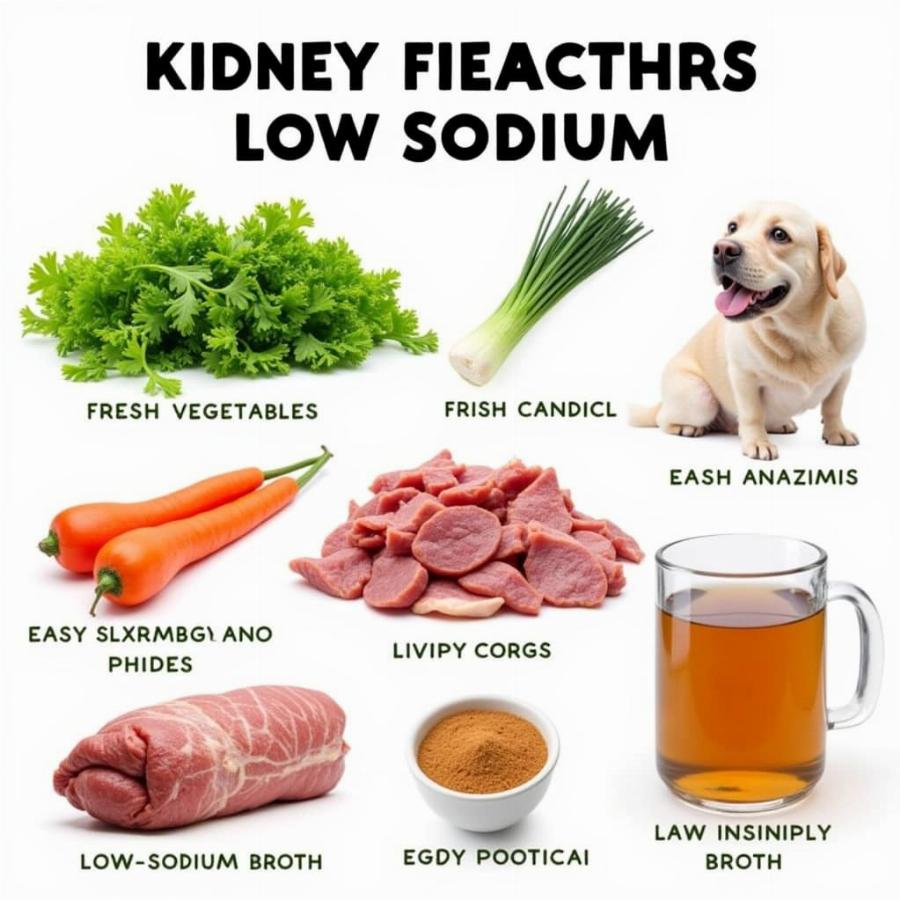Kidney disease can be a serious concern for our canine companions. A crucial part of managing this condition often involves a specialized diet, and many pet owners are turning to homemade dog food for dogs with kidney problems as a way to provide optimal nutrition. While commercial kidney diets are available, homemade food allows for complete control over ingredients and can cater to your dog’s specific needs and preferences. This article explores the benefits, considerations, and provides a sample recipe to guide you in creating nutritious and palatable meals for your furry friend.
Understanding Kidney Disease in Dogs
Before delving into homemade dog food, it’s crucial to understand how kidney disease affects dogs. The kidneys play a vital role in filtering waste and toxins from the bloodstream. When kidney function is compromised, these toxins can accumulate, leading to a range of health issues. Symptoms of kidney disease can be subtle, including increased thirst, frequent urination, loss of appetite, and weight loss. Early diagnosis is key to managing the disease effectively.
Benefits of Homemade Dog Food for Kidney Problems
Opting for homemade dog food allows you to tailor the diet precisely to your dog’s needs, especially when dealing with kidney problems. You have full control over the ingredients, ensuring they are fresh, high-quality, and free from artificial additives that can exacerbate kidney issues. This control also enables you to adjust phosphorus and protein levels, two critical factors in managing kidney disease. Plus, many dogs find homemade food more palatable, encouraging them to eat even when their appetite is diminished.
Key Nutritional Considerations
Creating homemade dog food for a dog with kidney problems requires careful consideration of specific nutrients. Lowering phosphorus intake is crucial as elevated phosphorus levels can worsen kidney damage. Protein restriction may also be necessary, although it’s important to ensure your dog still receives adequate amounts of high-quality protein for muscle maintenance. Sodium should also be restricted to help control blood pressure.
Phosphorus Control
Phosphorus is a mineral that healthy kidneys typically filter efficiently. However, damaged kidneys struggle with this task. Reducing phosphorus in the diet helps lessen the burden on the kidneys. This typically involves choosing low-phosphorus protein sources and avoiding phosphorus-rich ingredients.
Protein Management
While protein is essential, excessive protein can strain the kidneys. Your veterinarian can advise on the appropriate protein level for your dog’s specific needs. Choosing high-quality protein sources ensures your dog receives the essential amino acids they need without overloading their kidneys. lower protein dog food might offer valuable insights into protein management in dog food.
Sodium Restriction
Sodium can contribute to high blood pressure, which can further damage the kidneys. Using low-sodium ingredients and avoiding added salt is essential in managing kidney disease through diet.
 Nguyên liệu ít natri cho thức ăn cho chó thân thiện với thận
Nguyên liệu ít natri cho thức ăn cho chó thân thiện với thận
Sample Homemade Dog Food Recipe for Kidney Support
This recipe provides a starting point and should be adjusted based on your veterinarian’s recommendations for your dog’s specific needs.
-
Ingredients:
- 1 cup cooked white rice
- 1/2 cup cooked skinless chicken breast (boiled or baked, no seasoning)
- 1/4 cup cooked carrots
- 1/4 cup cooked green beans
- 1 tablespoon olive oil
- 1/2 teaspoon calcium carbonate (consult your vet for appropriate dosage)
-
Instructions:
- Combine all ingredients in a bowl.
- Mix well.
- Serve at room temperature or slightly warmed.
Remember to discuss this recipe with your veterinarian before implementing it. They can help you adjust the ingredients and portion sizes to meet your dog’s individual requirements. You can find additional ideas for dog-friendly meals by searching for hot dog casseroles or morning star corn dogs.
Conclusion
Homemade dog food can be a valuable tool in managing kidney disease in dogs. It empowers you to control the ingredients and tailor the diet to your dog’s specific needs. Always consult with your veterinarian before making any dietary changes, especially for a dog with a medical condition. They can guide you on the appropriate protein, phosphorus, and sodium levels, as well as ensure the diet is balanced and provides all the necessary nutrients for your furry friend. By working closely with your veterinarian and providing a carefully crafted homemade diet, you can help your dog maintain a good quality of life despite their kidney problems. If you are looking for other dog-friendly snacks, you might want to explore whether can dogs eat ritz crackers. Another option for a quick and tasty meal could be air fry bacon wrapped hot dogs.
FAQ
-
Can I feed my dog with kidney problems table scraps? No, table scraps are generally not recommended as they can be high in sodium, phosphorus, and other ingredients that can exacerbate kidney problems.
-
How much homemade food should I feed my dog with kidney issues? Portion sizes should be determined in consultation with your veterinarian, based on your dog’s weight, age, activity level, and severity of kidney disease.
-
Are there any specific supplements I should consider for my dog with kidney disease? Your veterinarian may recommend specific supplements, such as omega-3 fatty acids or B vitamins, depending on your dog’s individual needs.
-
How often should I feed my dog homemade food? Most dogs benefit from being fed small meals two to three times a day.
-
Can homemade food cure kidney disease in dogs? While homemade food can help manage the symptoms and slow the progression of kidney disease, it cannot cure the condition.